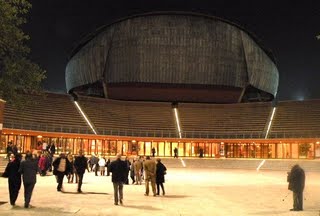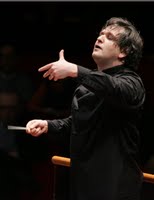Pappano and Balatsch Triumph with Beethoven's Missa Solemnis

Classical Travels
This Week in Italy
Beethoven's Missa Solemnis has always had a reputation for being monumental and impossibly difficult to perform - especially for the chorus. The difficulty stems in part from the fact that the work dates from late in Beethoven's life, by which time he was completely deaf and almost totally oblivious to the natural limits of the human voice. The great 'et vitam venturi' fugue in the "Credo" is a killer for sopranos and is rarely done well, particularly in "live" performance.
A recording of the piece that I have always treasured - one which still stands as an incomparable achievement - was done by Toscanini with the NBC Symphony and a chorus trained by Robert Shaw.
I once had the opportunity to ask Shaw how he had prepared his sopranos for the challenges of the 'et vitam venturi'; with typical modesty he responded that what one hears on the recording is pretty much an illusion, with the singers letting the orchestra do much of the heavy lifting.
 In Rome this week, Maestro Antonio Pappano (photo: right) tackled the Missa Solemnis with the chorus and orchestra of the Accademia Nazionale di Santa Cecilia and there was nothing illusory about his achievement. The chorus, prepared by the legendary Viennese choirmaster Norbert Balatsch, was magnificently fearless.
In Rome this week, Maestro Antonio Pappano (photo: right) tackled the Missa Solemnis with the chorus and orchestra of the Accademia Nazionale di Santa Cecilia and there was nothing illusory about his achievement. The chorus, prepared by the legendary Viennese choirmaster Norbert Balatsch, was magnificently fearless.The acoustics of the Sala Santa Cecilia in the Auditorium Parco della Musica are somewhat problematic, but the volume and accuracy of the 80-member chorus was remarkable by any standard.
While Maestro Pappano has been building a solid reputation as chief conductor at the Royal Opera House, Covent Garden, he is also much-admired in Italy for his work with the country's leading orchestra. Several weeks ago, EMI released a live recording of the Verdi Requiem by Pappano and the Santa Cecilia orchestra and chorus. It has received rave reviews.
Beethoven's Missa Solemnis is a very different kind of challenge. That too, Pappano met with distinction. Obviously familiar with all the trouble spots in this work, he took the time to sort them out in rehearsal; this performance was meticulously prepared.
Was it Pappano who encouraged the use of natural (i.e. no valves) trumpets here for a more authentic sound? His trumpeters appeared to have no problem at all with these demanding instruments, and the pure but penetrating sound was impressive.
He might also have encouraged his timpanist to use harder sticks more often in this piece, and play a more prominent role. Throughout the performance I had the impression the orchestra could have played much louder without coming close to covering the chorus, especially in the climaxes at the end of the "Gloria" and the "Credo".
This is where the acoustic deficiencies of the Sala Santa Cecilia come into play. I was sitting about half way back on the ground floor - surely a pretty good location - but the basses in the orchestra scarcely registered at all and the other string sections, for the most part, didn't fare much better. Concertmaster Carlo Maria Parazzoli was reasonably prominent in his extended solo in the Benedictus - he played beautifully - but the strings generally lacked warmth and presence.
This is a fairly common failing in most modern concert halls and in this respect the Sala Santa Cecilia is typical. It may be that at 2,800 seats, the hall is simply too big. I had anticipated better acoustics when I settled into my seat at the start of the concert and marveled at the fine wooden surfaces evident everywhere, including the ceiling.
Soloists for this performance were soprano Emma Bell, contralto Anna Larsson, tenor Roberto Sacca, and bass Georg Zeppenfeld. Bell's sound seemed unfocussed. Zeppenfeld could hardly be heard at all, except for his solo at the beginning of the "Agnus Dei".
The excellent programme notes revealed that Beethoven's "Missa Solemnis" had its first performance in Italy in 1924, with the Santa Cecilia orchestra conducted by Bernardino Molinari. Since then, this orchestra has made the piece part of its basic repertoire, presenting it on no fewer than eighteen occasions under conductors such as Victor de Sabata, Eugen Jochum, Carlo Maria Giulini, Giuseppe Sinopoli and Wolfgang Sawallisch. Norbert Balatsch has been the chorus master for every performance - five of them - given over the past twenty-five years.
On the whole, Pappano's performance of the Missa Solemnis was impressive. The choral work was outstanding and the discipline of his reading was altogether admirable. Tempi were well-considered and when they were a little quicker than usual, control was never in doubt.
In the darker moments of the work, however, I felt that Pappano's discipline seemed more than a little unyielding. This was especially true in the "Agnus Dei". This final movement of the Missa Solemnis has disappointed many a listener over the years. It is often felt to be abrupt and unsatisfying.
This, surely, is a place where the conductor must pay less attention to what the score says or doesn't say, and must enter into the spirit of the composer's vision.
Beethoven's 'dona nobis pacem' (give us peace) comes from the depths of the composer's soul and needs to be performed accordingly - with phrasing a little more expansive and emotional in the final bars. Pappano's reading was true to the letter of the score but missed the meaning of it all.
These disappointing final bars notwithstanding, one left the Sala Santa Cecilia grateful for having heard a superbly prepared Missa Solemnis in which Beethoven's fearsome technical challenges were met with fine musicianship.
Paul E. Robinson is the author of Herbert von Karajan: the Maestro as Superstar, and Sir Georg Solti: His Life and Music, both available at Amazon.com.
Labels: Accademia Nazionale di Santa Cecilia, Antonio Pappano, classical music blog, classical travels, Ludwig van Beethoven, Missa Solemnis




0 Comments:
Post a Comment
<$I18N$LinksToThisPost>:
Create a Link
<< Home